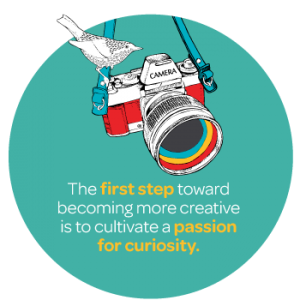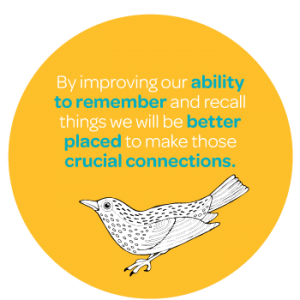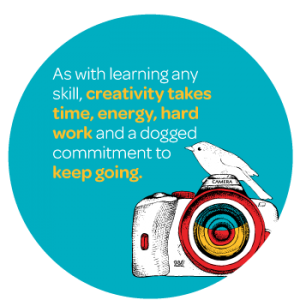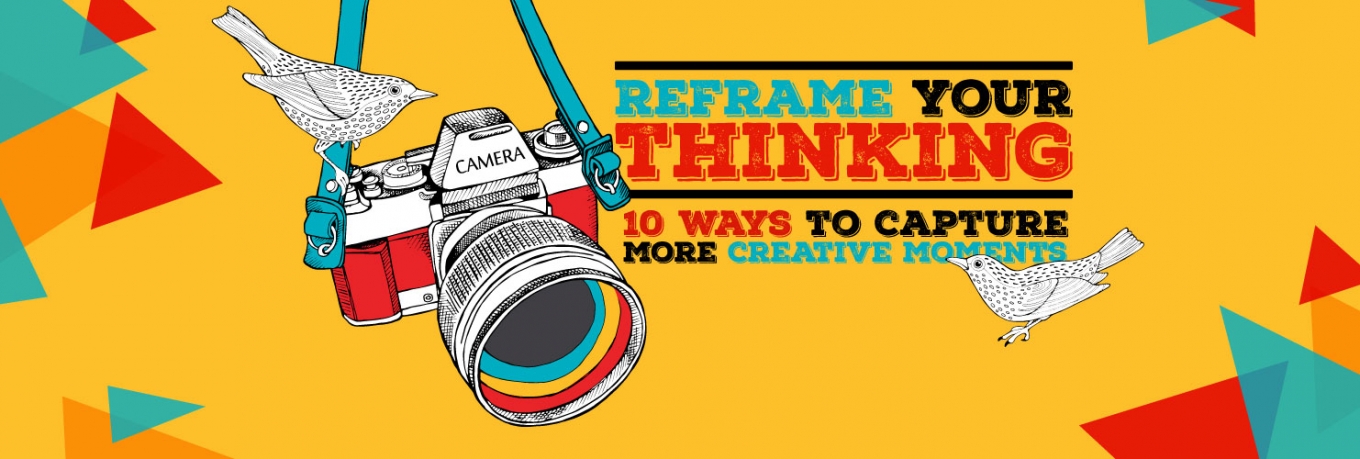If you want to live and work more creatively it could be time for a change of perspective.
By simply reframing the way you look at things and refining your angle of view, you can achieve a deeper, more intentional level of creativity.
Commit to thinking a little differently and consider these 10 less conventional ways to be more creative…
1. Be endlessly curious 
“The first step toward becoming more creative is to cultivate a passion for curiosity.” In his book, Creativity: The Psychology of Discovery and Invention, Mihaly Csikszentmihaly urges us to try to find something that surprises us each day, take the time to pause, stop, try new things and actually listen to what people are saying.
Ask questions, experiment, reconnect with your sense of wonder, be open to new ideas, dig deeper to explore things in a more profound way, and take inspiration from the words of Albert Einstein, “I have no special talent, I am only passionately curious.”
2. Focus on active looking
In the same way that active listening is more than just hearing, active looking is more than just seeing. Be present, be intentional, allow yourself to look at things for a moment longer than usual, concentrate fully on what you see and always be receptive to visual stimulation that can help you with your creative challenges.
As Leonardo da Vinci famously said, “Many people look, but few people see” and that mindful seeing is when creative moments burst into view.
3. Review and redraft
Try to push your thoughts further and further away from where they first began. Always be prepared to move an idea on to version 2 (then 3 then 4), develop it, search for the next iteration to refine and enhance it.
4. Exposure to memory and recall 
People tend to assume that to be creative they have to come up with something previously unseen. But creativity is rarely about something entirely new. Instead, it’s about making connections to your challenge with information that you already know and things that inspire you. By becoming better at remembering and recalling things we will be better placed to make those crucial connections.
Improve memory and recall skills by keeping a diary, playing brain games, doodling, avoiding multitasking and switching off frequently. This article explores 11 more ways to improve your memory with proven techniques that work.
5. Change your perception
Creativity begins with perception. If we always take things at face value and never stretch our imaginations to look beyond the obvious our creativity will always fall short. Break out of the cycle of seeing things for what they are and practise seeing things for what they could be.
6. Mental wandering
Contrary to the popular belief that you have to be focused to come up with great ideas, not concentrating might actually be what you need. Make time for moments of silence and contemplation (also known as daydreaming) without access to technology or other distractions.
Cognitive psychologist, Scott Barry Kaufman, studies how ‘mind wandering’ helps our brains to explore challenges from a different perspective, “Daydreaming is where things like problem solving, creativity, goal driven thought, future planning, seeing the perspective of another person, and so on – find space to exist.
“Aha moments don’t come from a directed and particular focus on a task, but by letting your mind wander and open up to other possibilities.”
7. Grit and determination
“Grit is living life like it’s a marathon, not a sprint.”
Angela Duckworth, author of Grit: The Power of Passion and Perseverance explains that “the secret to achieving what we want is not talent but a special blend of passion and persistence called grit”.
Many people believe that creativity is a skill we’re born with – we either possess it or we don’t – but this simply isn’t the case. As with learning any skill, it takes time, energy, hard work and a dogged commitment to keep going.
So develop a steadfast spirit to see things through and commit to persistently pushing your creative challenge on to its final execution and delivery.
Don’t give up, don’t run out of steam and don’t find excuses not to finish.
8. Filter your fears
Being creative can be a scary experience. It often requires us to step out of our comfort zones which exposes us to all sorts of uncomfortable thoughts – fear of rejection, embarrassment, other peoples’ opinions, not being good enough or good old-fashioned failure. The truth is that these feelings cannot be avoided entirely, but they can be managed.
In her book, Big Magic, Elizabeth Gilbert explains that your passion for creativity should coexist with your fears. They cannot be mutually exclusive. She encourages us to see them as ‘travelling companions’ but ultimately your creativity is the driver and your fear is the passenger with no say in the direction you’re going.
So strap yourself in and get comfortable with those uncomfortable thoughts by accepting that they’re a necessary part of the creative process.
9. Give yourself permission
Sources of inspiration are all around us but because we don’t always believe that we’re up to the challenge we don’t allow ourselves the chance to let that inspiration take hold. We miss opportunities to be stimulated and influenced by what we see.
Give your confidence a boost by purposely and resolutely telling yourself that it’s okay to create.
10. Practise, practise, practise
Creativity is a skill that needs to be consciously practised in the same way as training in athletics, rehearsing in dance or learning a new language. The more you do it the more natural it will become.
The key is to be smart about the way you do it. Practising hard can be a waste of time if you don’t practise intelligently. Be considerate about what you want to achieve, set realistic goals and practise with purpose and intent.
Look at creativity through a different lens
There is no right or wrong when it comes to creativity. And the beauty of it lies in every individual’s own unique blend of experiences and approaches. So take a step back, consider each of the points above, experiment with different situations and enjoy the learning along the way.
We don’t just talk about creativity. We make it happen too
If you’d like to explore some of the less conventional ways to build creativity into your work and personal life then get in touch. We run tailored workshops where we make it our mission to get you and your people thinking more creatively.

















